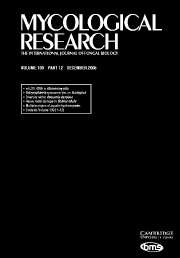Crossref Citations
This article has been cited by the following publications. This list is generated based on data provided by
Crossref.
Kapoor, Rupam
Chaudhary, Vidhi
and
Bhatnagar, A. K.
2007.
Effects of arbuscular mycorrhiza and phosphorus application on artemisinin concentration in Artemisia annua L..
Mycorrhiza,
Vol. 17,
Issue. 7,
p.
581.
Chaudhary, Vidhi
Kapoor, Rupam
and
Bhatnagar, A.K.
2008.
Effectiveness of two arbuscular mycorrhizal fungi on concentrations of essential oil and artemisinin in three accessions of Artemisia annua L..
Applied Soil Ecology,
Vol. 40,
Issue. 1,
p.
174.
Fuchs, Birgit
and
Haselwandter, Kurt
2008.
Mycorrhiza.
p.
565.
Gianinazzi, Silvio
Gollotte, Armelle
Binet, Marie-Noëlle
van Tuinen, Diederik
Redecker, Dirk
and
Wipf, Daniel
2010.
Agroecology: the key role of arbuscular mycorrhizas in ecosystem services.
Mycorrhiza,
Vol. 20,
Issue. 8,
p.
519.
De la Rosa-Mera, Claudia Janette
Ferrera-Cerrato, Ronald
Alarcón, Alejandro
de Jesús Sánchez-Colín, María
and
Muñoz-Muñiz, Omar David
2011.
Arbuscular mycorrhizal fungi and potassium bicarbonate enhance the foliar content of the vinblastine alkaloid in Catharanthus roseus.
Plant and Soil,
Vol. 349,
Issue. 1-2,
p.
367.
Das, Aparajita
Kamal, Shwet
Shakil, Najam Akhtar
Sherameti, Irena
Oelmüller, Ralf
Dua, Meenakshi
Tuteja, Narendra
Johri, Atul Kumar
and
Varma, Ajit
2012.
The root endophyte fungusPiriformospora indicaleads to early flowering, higher biomass and altered secondary metabolites of the medicinal plant,Coleus forskohlii.
Plant Signaling & Behavior,
Vol. 7,
Issue. 1,
p.
103.
Singh, R. K.
and
Gogoi, P.
2012.
Augmented growth of long pepper in response to arbuscular mycorrhizal inoculation.
Journal of Forestry Research,
Vol. 23,
Issue. 2,
p.
339.
Subramanian, Rammohan
Zaini Asmawi, Mohd.
and
Sadikun, Amirin
2012.
A bitter plant with a sweet future? A comprehensive review of an oriental medicinal plant: Andrographis paniculata.
Phytochemistry Reviews,
Vol. 11,
Issue. 1,
p.
39.
Mohamed Saleem, A.
2013.
Natural Products.
p.
3325.
Singh, Rakshapal
Soni, Sumit K.
and
Kalra, Alok
2013.
Synergy between Glomus fasciculatum and a beneficial Pseudomonas in reducing root diseases and improving yield and forskolin content in Coleus forskohlii Briq. under organic field conditions.
Mycorrhiza,
Vol. 23,
Issue. 1,
p.
35.
Hridya, A.C.
Byju, G.
and
Misra, Raj Sekhar
2013.
Effect of biocontrol agents and biofertilizers on root rot, yield, harvest index and nutrient uptake of cassava (Manihot esculantaCrantz).
Archives of Agronomy and Soil Science,
Vol. 59,
Issue. 9,
p.
1215.
Zeng, Yan
Guo, Lan-Ping
Chen, Bao-Dong
Hao, Zhi-Peng
Wang, Ji-Yong
Huang, Lu-Qi
Yang, Guang
Cui, Xiu-Ming
Yang, Li
Wu, Zhao-Xiang
Chen, Mei-Lan
and
Zhang, Yan
2013.
Arbuscular mycorrhizal symbiosis and active ingredients of medicinal plants: current research status and prospectives.
Mycorrhiza,
Vol. 23,
Issue. 4,
p.
253.
Shoemaker, Ginger
and
Wyllie-Echeverria, Sandy
2013.
Occurrence of rhizomal endophytes in three temperate northeast pacific seagrasses.
Aquatic Botany,
Vol. 111,
Issue. ,
p.
71.
Sakthivel, Uliyan
and
Karthikeyan, Balathandayutham
2015.
Plant-Growth-Promoting Rhizobacteria (PGPR) and Medicinal Plants.
Vol. 42,
Issue. ,
p.
89.
Egamberdieva, Dilfuza
and
Teixeira da Silva, Jaime A.
2015.
Plant-Growth-Promoting Rhizobacteria (PGPR) and Medicinal Plants.
Vol. 42,
Issue. ,
p.
287.
Nasim, Faiz-ul Hassan
Khalil, Rabia
Sumreen, Ayesha
Chaudhry, Muhammad Shafiq
and
Ashraf, Muhammad
2015.
Plants, Pollutants and Remediation.
p.
99.
Welling, M. T.
Liu, L.
Rose, T. J.
Waters, D. L. E.
Benkendorff, K.
and
Weber, A.
2016.
Arbuscular mycorrhizal fungi: effects on plant terpenoid accumulation.
Plant Biology,
Vol. 18,
Issue. 4,
p.
552.
Swamy, Mallappa Kumara
Akhtar, Mohd Sayeed
and
Sinniah, Uma Rani
2016.
Plant, Soil and Microbes.
p.
145.
Sharma, Esha
Anand, Garima
and
Kapoor, Rupam
2017.
Terpenoids in plant and arbuscular mycorrhiza-reinforced defence against herbivorous insects.
Annals of Botany,
p.
mcw263.
Kilam, Divya
Sharma, Priyanka
Agnihotri, Abha
Kharkwal, Amit
and
Varma, Ajit
2017.
Mycorrhiza - Eco-Physiology, Secondary Metabolites, Nanomaterials.
p.
283.




